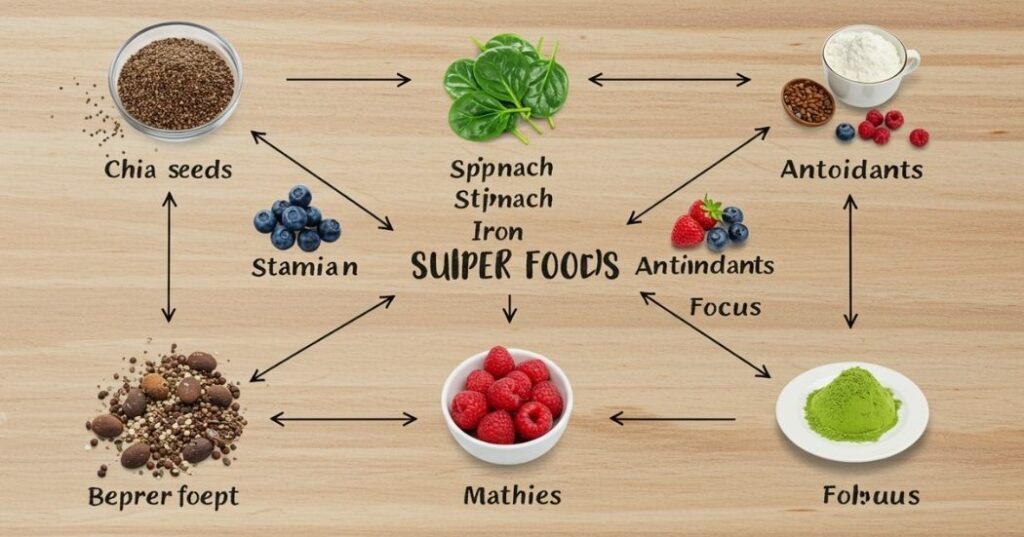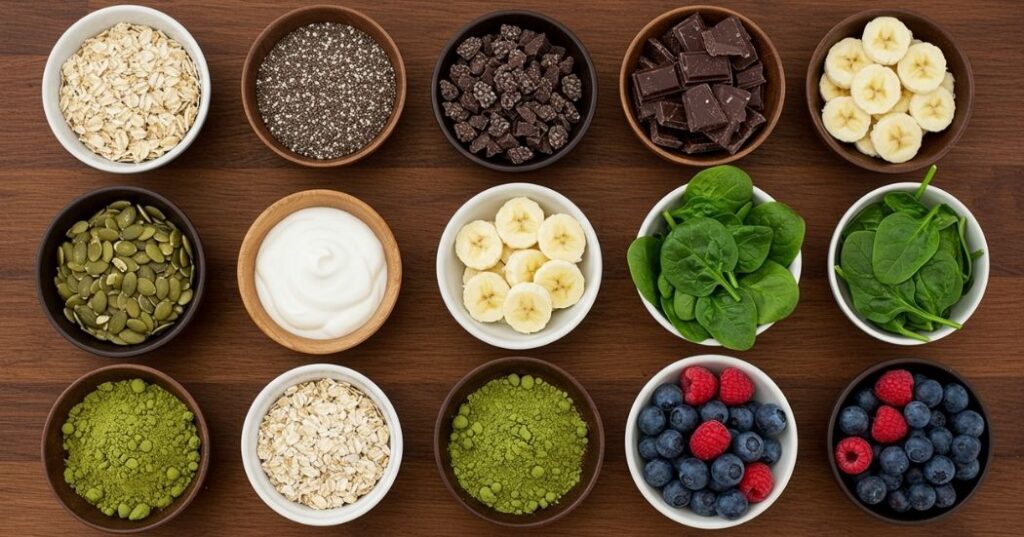Which Superfoods Actually Help Boost Your Energy—and Why?
Do you often feel that familiar mid-day crash, struggle to focus in the afternoon, or find yourself reaching for another cup of coffee just to power through? The secret to achieving sustained energy, razor-sharp focus, and a consistently vibrant mood may not be found in your mug, but strategically placed right on your plate.
These science-backed superfoods are packed with nutrients designed to naturally balance blood sugar, combat fatigue at its root, and powerfully fuel your day from morning till night. Let’s explore how to integrate these natural energizers into your diet for a noticeable boost.
Why Energy-Boosting Superfoods Are Your Daily Allies

Our bodies are complex machines, and like any machine, they require the right kind of fuel to perform optimally. When we experience fatigue, it’s often a signal of imbalanced blood sugar, nutrient deficiencies, or simply inadequate energy supply from our diet. Superfoods to boost energy work by:
- Stabilizing Blood Sugar: Preventing sharp spikes and crashes that lead to “sugar slumps” and intense cravings.
- Optimizing Cellular Energy Production: Providing essential vitamins and minerals that act as co-factors in converting food into usable energy (ATP).
- Reducing Inflammation: Certain nutrients fight chronic inflammation, a silent energy drain.
- Supporting Brain Function: Supplying compounds crucial for focus, mood, and mental clarity.
- Ensuring Nutrient Density: Packing a lot of nutritional punch into fewer calories, making every bite count.
By incorporating these specific foods, you’re not just getting a temporary jolt; you’re building a foundation for sustained vitality.
Top 9 Superfoods to Naturally Boost Your Energy Levels (and Why They Work)

This curated list of superfoods to boost energy focuses on ingredients that offer comprehensive benefits for both physical and mental stamina, helping you conquer fatigue naturally.
1. Bananas: Fast, Clean Fuel
- Why it works: Bananas offer a unique combination of natural glucose (for quick energy) and dietary fiber (to ensure that energy is released steadily, preventing a crash). They’re also an excellent source of potassium, a vital electrolyte that supports proper nerve and muscle function, crucial for sustained physical activity and preventing fatigue.
- Nutritional Highlight: Natural sugars, fiber, potassium, B vitamins.
- Try it: Pair a banana with a tablespoon of natural peanut or almond butter for a perfect pre-workout boost or a satisfying, energy-sustaining afternoon snack.
2. Spinach: Iron-Powered Performance
- Why it works: This leafy green is a powerhouse of iron, an essential mineral that combats fatigue by playing a central role in hemoglobin production, which carries oxygen in your blood. It’s also rich in magnesium, another critical mineral that supports ATP production (adenosine triphosphate), the primary energy currency of your cells.
- Nutritional Highlight: Iron, magnesium, Vitamin K, Vitamin A.
- Bonus Tip: To significantly enhance the absorption of non-heme (plant-based) iron from spinach, always pair it with vitamin C-rich foods like a squeeze of lemon juice, bell peppers, or berries. Add spinach to smoothies, salads, or lightly sauté it.
3. Eggs: Protein for Mental and Physical Stamina
- Why it works: Eggs are celebrated as a “complete protein” source, providing all nine essential amino acids necessary for muscle repair and sustained energy. They are also rich in B vitamins, particularly B12, B6, and folate, which are fundamental for converting food into energy and supporting optimal brain function, mood regulation, and a healthy metabolism.
- Nutritional Highlight: Complete protein, B vitamins (especially B12), choline.
- Try it: Hard-boiled eggs paired with a handful of vibrant cherry tomatoes make for a quick, protein-rich, and highly portable snack that will keep you full and focused.
4. Almonds: The Energy Nut
- Why it works: Almonds are packed with a beneficial blend of healthy fats (monounsaturated), fiber, vitamin E, and magnesium. These nutrients work synergistically to fight oxidative stress (which can cause fatigue) and support stable blood sugar levels, providing a sustained release of energy rather than a quick spike.
- Nutritional Highlight: Healthy fats, fiber, Vitamin E, magnesium.
- Tip: For better digestibility and enhanced nutrient absorption, consider soaking almonds overnight before consuming them. Enjoy a small handful as a snack or add them to your morning oatmeal.
5. Berries: Nature’s Energy Candy
- Why it works: Blueberries, raspberries, strawberries, and blackberries are not just delicious; they are incredibly rich in antioxidants, especially anthocyanins. These compounds help combat oxidative stress and inflammation in the body, both of which can contribute to feelings of fatigue. Their relatively low glycemic index means they provide a sweet energy boost without causing blood sugar spikes and subsequent crashes.
- Nutritional Highlight: High in antioxidants, fiber, low glycemic impact.
- Best pick: Incorporate a variety of fresh or frozen berries into your diet daily – in smoothies, oatmeal, or as a standalone snack.
6. Sweet Potatoes: Long-Lasting Complex Carbs
- Why it works: Sweet potatoes are an excellent source of complex carbohydrates, meaning they provide slow-releasing energy that keeps you feeling full and energized for longer periods. They are also abundant in beta-carotene (a precursor to Vitamin A) and fiber. Furthermore, they are rich in manganese, a trace mineral that plays a crucial role in helping your body break down carbohydrates and protein into usable energy.
- Nutritional Highlight: Complex carbs, fiber, beta-carotene, manganese.
- Eat it: Enjoy roasted sweet potato wedges with a drizzle of olive oil and a sprinkle of rosemary for a flavorful and energizing side dish. They make a fantastic, nutrient-dense alternative to white potatoes.
7. Oats: Morning Metabolism Booster
- Why it works: Oats, particularly steel-cut or rolled oats, are rich in soluble fiber (specifically beta-glucan), which slows down digestion significantly. This leads to a gradual and steady release of glucose into your bloodstream, providing consistent energy and preventing the mid-morning slump. Oats also contain essential micronutrients like iron, zinc, and a range of B vitamins, all crucial for cellular energy production.
- Nutritional Highlight: Soluble fiber, iron, zinc, B vitamins.
- Top it with: For an extra energy boost, top your oatmeal with healthy fats (like a tablespoon of ground flax seeds or almond butter) or fresh fruit (like berries or banana).
8. Salmon: Brain + Body Energy
- Why it works: Salmon is a top-tier source of anti-inflammatory omega-3 fatty acids (EPA and DHA). Chronic inflammation can be a significant hidden cause of fatigue and brain fog, and omega-3s actively combat this. Its high-quality protein content supports muscle maintenance, repair, and overall metabolic function, contributing to sustained physical and mental energy.
- Nutritional Highlight: Omega-3s (EPA/DHA), high protein, Vitamin D.
- Sustainable tip: Opt for wild-caught salmon when possible. Canned salmon (packed in water or olive oil) is a convenient, budget-friendly, and equally nutritious option for quick meals or salads.
9. Avocados: Fat-Fueled Focus
- Why it works: Avocados are renowned for their abundance of monounsaturated fats, which provide a stable, long-lasting source of energy for both your body and brain. These healthy fats help improve satiety and nutrient absorption. Avocados are also rich in potassium, crucial for maintaining electrolyte balance, nerve signals, and preventing fatigue often linked to imbalances.
- Nutritional Highlight: Monounsaturated fats, potassium, fiber, B vitamins.
- Add to: Incorporate creamy avocado into your morning toast, blend into smoothies for richness, or add to salads for a boost of healthy fats and sustained focus.
☕ Bonus: Natural Energy Hacks (Beyond Food)
While nutrition is foundational, a holistic approach to energy involves more than just what’s on your plate. Integrate these simple, powerful habits to further amplify your natural energy levels:
- Stay Hydrated: Dehydration is a common cause of fatigue. Aim for at least 2 liters (about 8 glasses) of water per day, and more if you’re active.
- Move Every 90 Minutes: Avoid prolonged sitting. Even a 5-minute walk, stretching session, or a few jumping jacks every 90 minutes can significantly improve circulation, mental alertness, and energy levels.
- Prioritize Quality Sleep: Aim for a consistent 7–8 hours of quality sleep each night. Practice good sleep hygiene: a consistent sleep-wake schedule, a cool and dark bedroom, and a relaxing wind-down routine. Sleep is where true energy recovery happens.
- Limit Ultra-Processed Snacks and Sugary Drinks: These provide only fleeting energy, followed by inevitable crashes and can lead to chronic inflammation and metabolic stress that drain your energy long-term. Opt for whole-food snacks from the list above instead.
- Manage Stress: Chronic stress leads to elevated cortisol, which can deplete energy stores. Incorporate mindfulness, deep breathing, or short meditation sessions into your daily routine.
📌 Quick Meal Ideas with Energy Superfoods: Fueling Your Day Made Easy

Here are some simple ways to incorporate these energy-boosting superfoods into your daily meals:
| Meal | Example | Benefits |
|---|---|---|
| Breakfast | Oats (7) + Berries (5) + Chia Seeds (from Nuts & Seeds) | Steady energy, fiber, antioxidants, omega-3s. |
| Mid-Morning Snack | Almonds (4) + a piece of dark chocolate (≥70% cocoa) or Boiled Egg (3) + a handful of leafy greens (2) | Healthy fats, protein, sustained fullness, vital nutrients. |
| Lunch | Large Spinach Salad (2) + Baked Salmon (8) + Sliced Avocado (9) | Complete protein, healthy fats, fiber, antioxidants, anti-inflammatory. |
| Afternoon Snack | Banana (1) + Almond Butter (from Nuts & Seeds) | Quick, sustained energy, potassium, healthy fats. |
| Dinner | Roasted Sweet Potatoes (6) + Steamed Broccoli (from Leafy Greens) + Baked Tofu/Chicken (lean protein) | Complex carbs, vitamins, minerals, balanced protein for recovery. |
🔗 Explore More from Nura: Holistic Health for Lasting Vitality
A well-fueled body is a happy and energetic body. If you’re ready to take your energy to the next level, explore these interconnected lifestyle strategies that support sustained vitality—beyond just superfoods:
- → Calm Inflammation, Energize Naturally:
Chronic inflammation can silently drain your energy and impair nutrient absorption. Learn how anti-inflammatory foods like berries, leafy greens, and turmeric support steady energy.
👉 Anti-Inflammatory Foods List - → Heal Your Gut to Fuel Your Life:
Your gut is your second brain—and a vital energy engine. Discover how cultivating a healthy microbiome through fiber-rich, plant-based foods can unlock better metabolism and brighter mood.
👉 Beginner’s Guide to Gut Health Diet - → Sleep to Recharge Your Energy:
Deep, restorative sleep is where true recovery happens. Explore how nutrition impacts sleep quality and discover the best foods to help you reset and wake up recharged.
👉 Foods for Sleep and Muscle Recovery
✨ Ready to fuel your energy the natural way—day and night?
Start by adding one of these science-backed strategies to your daily routine and experience the difference. Your energy is built, not borrowed.
📚 References
- Harvard T.H. Chan. The Nutrition Source – Energy-Boosting Foods
- Healthline. 11 Foods That Give You Energy
- WebMD. Energy Foods That Work
- National Institutes of Health (NIH). Magnesium Fact Sheet for Health Professionals.
- American Journal of Clinical Nutrition. Dietary iron intake and fatigue.
https://pubmed.ncbi.nlm.nih.gov/11263507/ (Example – precise citation may vary) - Journal of the American Heart Association. Omega-3 Fatty Acids and Cardiovascular Disease: An Update.

